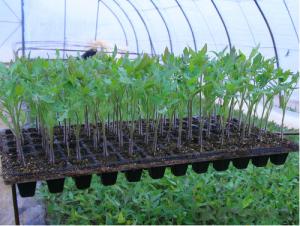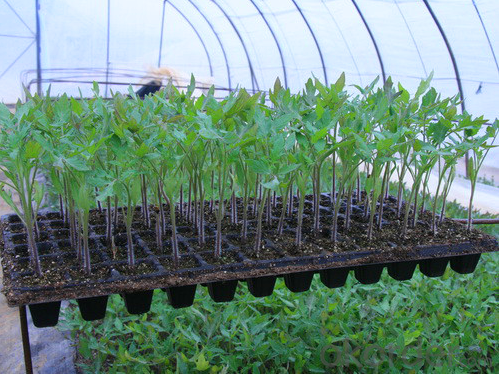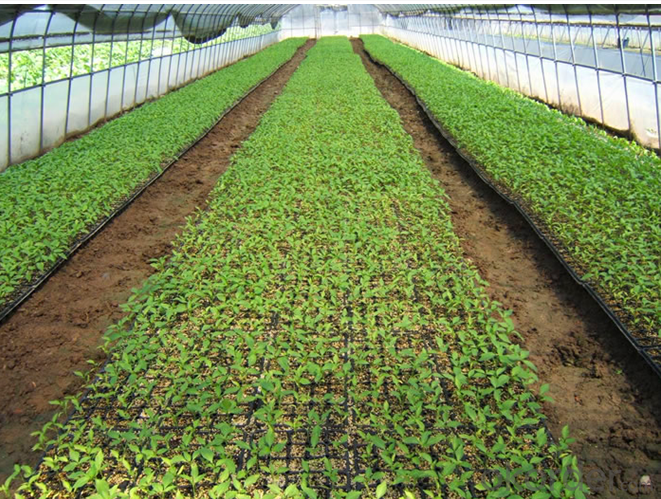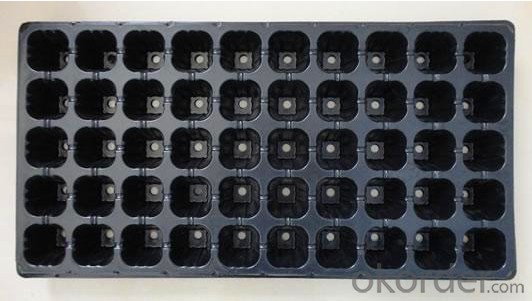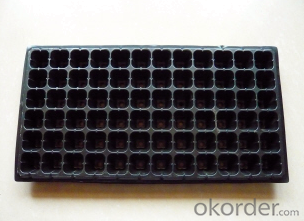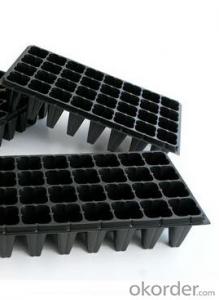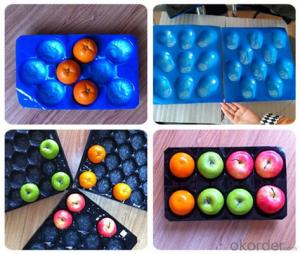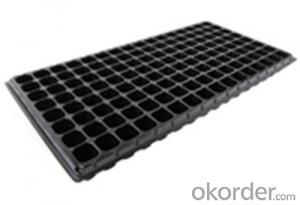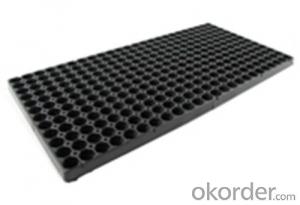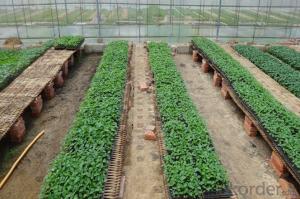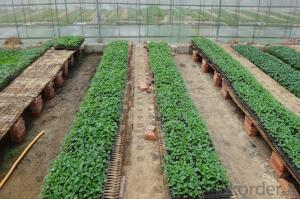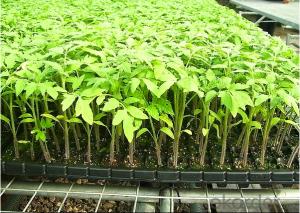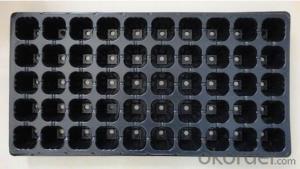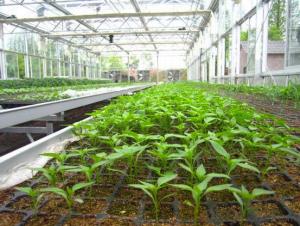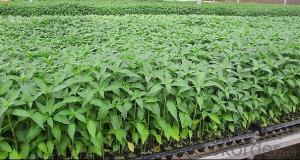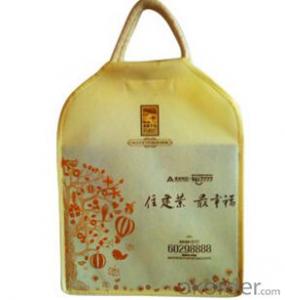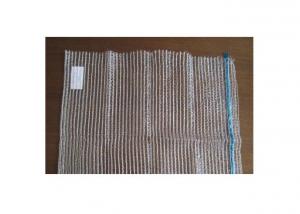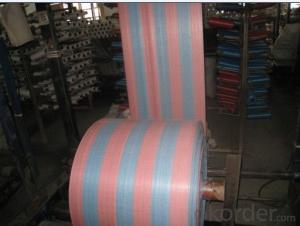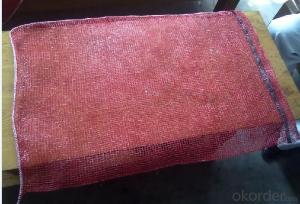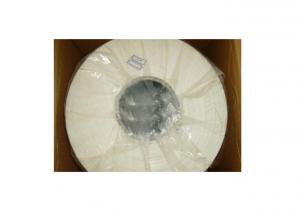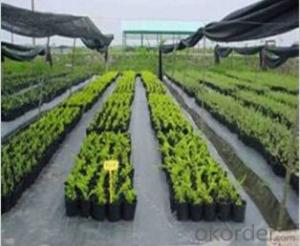Flat Tray HIPS Made Plastic Greenhouse Usage Plug Trays (Growing and Seedling)
- Loading Port:
- China main port
- Payment Terms:
- TT OR LC
- Min Order Qty:
- 3000 pc
- Supply Capability:
- 50000 pc/month
OKorder Service Pledge
OKorder Financial Service
You Might Also Like
Brief Introduction to CNBM:
CNBM International Corporation (CNBM International) is the most important trading platform of CNBM Group Corporation, a state-owned company under the direct supervision of State-owned Assets Supervision and Administration Commission of the State Council.
CNBM International is highly recognized by its business partners and clients all over the world and has obtained rapid development under the spirit of win-win. We will carry on the mutual beneficial, innovative and revolutionary trading structure as we did before, create value for our employees, share holders and clients and benefit the whole society in our future development.
Features of Plug Trays (Growing and Seedling) HIPS Made Plastic Plug Tray for Greenhouse:
· Material: HIPS
· Thickness: 0.5mm-1.5mm, Standard:1mm
· Weight: 80g(±5)g-230g(±5)g, Standard weight:155g(±5)g
· Size: length:490mm-540mm, width:190mm-345mm,depth:25mm-150mm
· Standard:540mmX280mm
· Cell count: 18-512
· Package: In Carton
· Warrenty: 8-10 times
Picture:
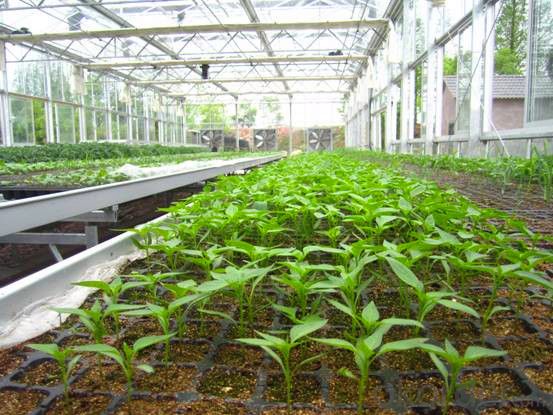
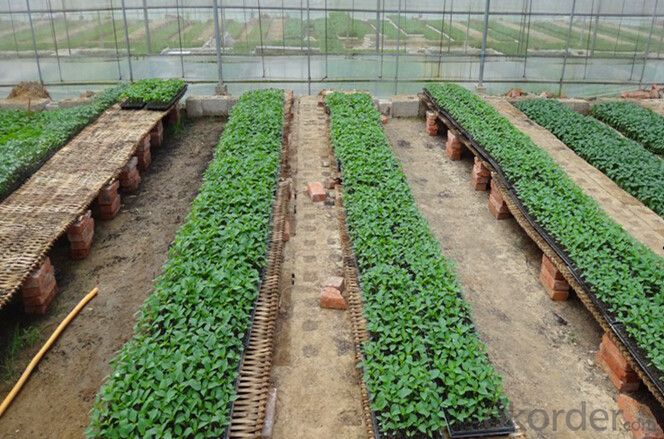
Specification of Plug Trays (Growing and Seedling) HIPS Made Plastic Plug Tray for Greenhouse:
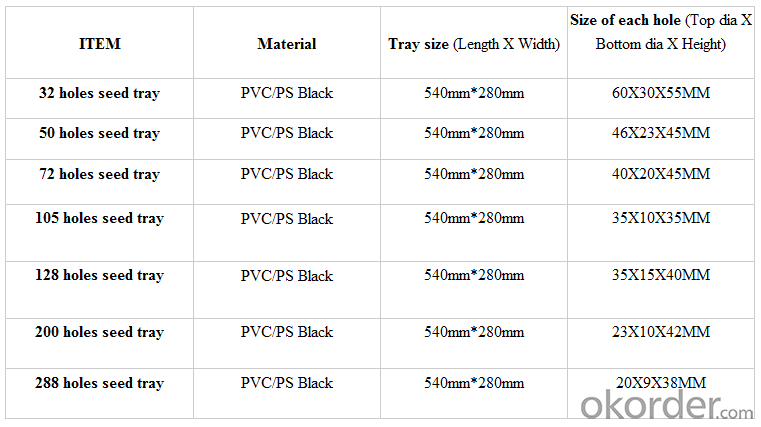
FAQ of Plug Trays (Growing and Seedling) HIPS Made Plastic Plug Tray for Greenhouse:
Q:1.How many times can the seed tray be used?
A: Under the same environment, it is decided by the thickness. Usually 0.6mm thickness can be used for 1 or 2 times.
1.0 thickness can be used for 3-4 times. 1.5 thickness can be used for 8-10 times.
Q: 2.How long is the production time?
A: Usually one to two weeks.
Q: 3.How is the seed tray being packaged?
A: They can be packaged in carton or pallets. Carton size is 1375px*725px*1250px.
- Q: hey can anybody body provide me with 5 or more resolutions to aviod plastic and products as far as possible.
- 1.canvas shopping bags instead of plastic ones 2.Get rid of your plastic dishes and cups, and replace them with glass varieties 3.Avoid products that are packaged in plastic 4.stainless steel water bottle instead of plastic bottles 5.stopped using plastic dish scrubbies to wash dishes. I now use Twist sponges, which are all natural and biodegradable. 6.)I stopped buying cream hand lotion, instead lotion that comes in a metal tin 7.)I return my styrofoam egg cartons
- Q: This question asks if it is possible for farmers to incorporate recycled agricultural plastic items into their farming practices.
- <p>Yes, farmers can use recycled agricultural plastic products in their farming operations. Recycled plastics can be repurposed into various farming materials such as mulch films, irrigation pipes, and greenhouse coverings. This not only reduces waste but also conserves resources. However, it's crucial to ensure that the recycled plastics meet quality standards to avoid contamination and maintain soil health. The use of recycled plastics in agriculture is an environmentally friendly practice that promotes sustainability.</p>
- Q: What is the water drainage capacity of a nursery tray?
- The water drainage capacity of a nursery tray can vary depending on its design and material. However, in general, nursery trays are designed to have good drainage capabilities to prevent waterlogging and promote healthy plant growth. They typically have multiple drainage holes or slots that allow excess water to drain out efficiently, preventing the roots from becoming waterlogged. The specific drainage capacity can vary, but nursery trays are typically designed to allow water to drain at a sufficient rate to maintain appropriate moisture levels for the plants.
- Q: What are some ground cover options for a Japanese-style courtyard?
- Some ground cover options for a Japanese-style courtyard include moss, gravel, stepping stones, or low-growing plants like mondo grass, creeping thyme, or Asian jasmine.
- Q: How do agricultural plastic products affect soil health?
- Agricultural plastic products can have both positive and negative effects on soil health. On one hand, plastic mulches can help retain soil moisture, suppress weed growth, and prevent erosion, leading to improved soil health. Additionally, plastic films used for greenhouse cultivation can provide a controlled environment for better plant growth and yield. However, improper disposal of plastic products or the use of non-biodegradable plastics can have detrimental consequences. Plastic residues can accumulate in the soil, affecting its structure, nutrient cycling, and microbial activity. Moreover, plastic debris can contaminate water sources, harm soil-dwelling organisms, and disrupt the overall ecosystem. Therefore, careful management and responsible use of agricultural plastics are crucial to minimize their negative impact on soil health.
- Q: What are the recent advancements in the field of agricultural plastic products?
- <p>Yes, there are several new technologies in agricultural plastic products. These include biodegradable plastics made from plant-based materials, which reduce environmental impact. There's also the development of smart or 'intelligent' plastics that can change properties based on environmental conditions, enhancing crop protection. Precision agriculture technologies are being integrated with plastic products, such as sensors embedded in irrigation systems, to optimize water usage. Additionally, there's an increase in the use of nanotechnology in plastics to improve their strength and longevity while reducing the amount needed. These advancements aim to increase efficiency, sustainability, and crop yield in agriculture.</p>
- Q: How do you choose a ground cover that is resistant to weeds?
- When choosing a ground cover that is resistant to weeds, there are a few key factors to consider. Firstly, opt for dense and vigorous ground cover plants that can effectively crowd out weed growth. Low-growing options like creeping thyme, creeping Jenny, or vinca minor are known for their ability to suppress weeds. Additionally, selecting ground covers with thick foliage or dense root systems can create a barrier that inhibits weed growth. It is also important to choose ground covers that can thrive in the specific conditions of your garden, such as sunlight exposure, soil type, and moisture levels. Lastly, regular maintenance practices like mulching, proper watering, and periodic hand weeding can further minimize weed growth and help your chosen ground cover thrive.
- Q: Do nursery trays come with a transparent lid for greenhouse use?
- Yes, nursery trays often come with a transparent lid specifically designed for greenhouse use.
- Q: This question asks about the impact of agricultural plastic products on soil moisture and fertility.
- <p>Agricultural plastic products, such as mulch films and drip irrigation systems, can significantly affect soil moisture and fertility. They help retain soil moisture by reducing evaporation, which is particularly beneficial in arid regions. This moisture retention can lead to increased water-use efficiency and crop yields. Additionally, plastic products can improve soil fertility by aiding in nutrient management. For instance, controlled-release fertilizers can be incorporated with plastic mulch to deliver nutrients directly to the plant roots, enhancing nutrient uptake and reducing nutrient leaching. However, improper disposal or long-term use of plastic products can lead to soil contamination and reduced soil fertility due to the accumulation of microplastics and chemical residues, which can disrupt soil structure and microbial activity. Therefore, the impact of agricultural plastic products on soil moisture and fertility is complex and depends on their management and environmental conditions.</p>
- Q: How do you prevent ground cover plants from choking out native plant species?
- One way to prevent ground cover plants from choking out native plant species is by implementing proper management practices. This includes regular monitoring and controlling the growth of ground cover plants through timely trimming, mowing, or pruning. Additionally, planting native species alongside ground cover plants can help maintain a balance and prevent any one species from overpowering the others. It is also crucial to remove any invasive ground cover species that may pose a threat to native plants.
Send your message to us
Flat Tray HIPS Made Plastic Greenhouse Usage Plug Trays (Growing and Seedling)
- Loading Port:
- China main port
- Payment Terms:
- TT OR LC
- Min Order Qty:
- 3000 pc
- Supply Capability:
- 50000 pc/month
OKorder Service Pledge
OKorder Financial Service
Similar products
Hot products
Hot Searches
Related keywords
